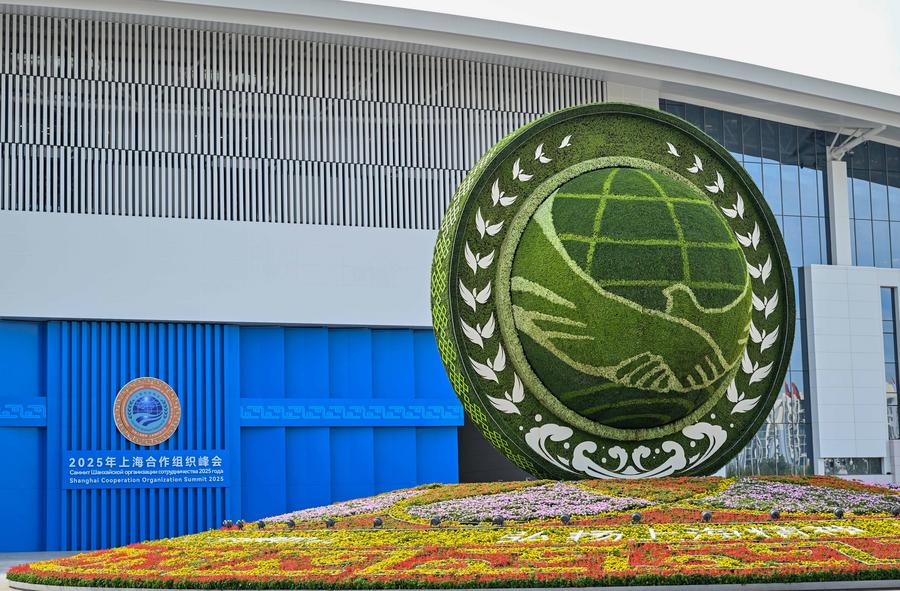Experts highlight potential to enhance multilateralism and offer new solutions

Experts have hailed the Global Governance Initiative proposed by President Xi Jinping as a timely response to today's complex international challenges, saying it offers new insights and solutions for enhancing global governance.
Xi presented the initiative on Monday at the "Shanghai Cooperation Organization Plus" Meeting in Tianjin, where he urged nations to uphold sovereign equality, abide by the international rule of law, practice multilateralism, advocate a people-centered approach and focus on taking concrete actions.
Jack Perry, chairman of the 48 Group in London, said that at a time of global turbulence — with unilateralism and protectionism undermining multilateral mechanisms — the business community is feeling the strain.
"President Xi's Global Governance Initiative comes at the right moment, offering fresh wisdom and solutions for improving global governance and deserving the world's close attention," Perry said.
As a long-standing promoter of Sino-British trade, the 48 Group has a keen sense that China has consistently been at the forefront of upholding multilateralism and maintaining a high level of openness, he said.
China's role as a key driver of economic globalization "gives added authority and persuasiveness to the Global Governance Initiative, and lays the foundation for broad international support", he added.
Najla Alzarooni, a researcher at the College of Public Policy, University of Sharjah, in the United Arab Emirates, said the initiative is a highly condensed summary of the SCO's philosophy and its development over the past 24 years, demonstrating President Xi's farsighted vision.
"It is consistent with the sovereignty, noninterference and development principles that the Global South is sticking to," she said. The initiative should be seen as "a living model of cooperative governance, offering the international community a more compelling alternative" for building a multipolar and fair world essential in the 21st century, she said.
Since becoming a dialogue partner in 2023, the UAE has shown its commitment to promoting the Shanghai Spirit — the philosophical backbone of the SCO, she said. Positioned at the crossroads of Asia, Africa and Europe, the UAE can bridge cooperation in energy, AI, finance and green projects under the SCO framework, she added.
Onyango K'Onyango, a communications consultant in Kenya, said the Global Governance Initiative offers renewed hope for the world at a time of unprecedented challenges.
By outlining five principles — including adherence to sovereign equality and the practice of multilateralism — China has demonstrated it is advancing a sound foreign policy for the benefit of humanity, he said.
Nations should work together to shape a fairer world order built on win-win solutions, he said, noting that hegemony and protectionism must not be allowed to erode the gains made through multilateralism.
Mehmood Ul Hassan Khan, president of the Center for Knowledge and Public Policy in Lahore, Pakistan, described Xi's speech at the SCO meeting as "both historic and futuristic", with the introduction of the Global Governance Initiative at its core.
The initiative marks a major step toward advancing global equality, strengthening the role of developing countries, reinforcing an international system based on fairness and justice, and promoting the role of the Global South, Mehmood said.
"This noble concept of global governance could be achieved by deepening cooperation with international organizations ... and participating constructively in international and regional affairs," he said.
Jorge Heine, a former Chilean Cabinet minister and ambassador to China, stated that the SCO Summit in Tianjin marked a significant milestone in international affairs, reflecting both the rise of the Global South and the growing importance of the Eurasian geopolitical space in world politics.
"In stark contrast to the unilateralism proclaimed in certain Western capitals, the SCO summit has put, once again, front and center the values of multilateralism and international cooperation," he said.
Francisco Urdinez, director of the Center of Asian Studies at the Pontifical Catholic University of Chile, praised China's continued efforts to assist SCO members in green transition within the organization's framework. Unlike West-led environmental initiatives, he noted, these efforts do not impose political strings.
Cui Haipei in Dubai, UAE; Victor Raballa in Nairobi, Kenya; and Chen Yingqun in Beijing contributed to this story.
Contact the writers at gaoyang@chinadailyusa.com


